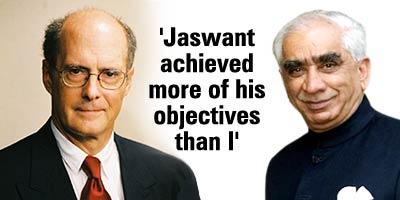Last Updated on 5 years ago by Piyush Jain
Engaging India: Diplomacy, Democracy, and the Bomb
This book states the story of the turning point of India-US relations. The story details the fact-filled elaboration of how the events took turns on India becoming a nuclear power; it’s recovering back from the sanctions and build a position in the world it is at. The book gives an in-depth understanding of the factors which help the country stop or allow to make decisions. One needs to look at the political pressures, military balances, neighbors around, your economy, and your neighbor’s economy to decide on important aspects like these.

Pretext and Reasons for tilting towards Nuclear Options
India has been a peace-loving country, but its neighbors push it to think over the same. The unfair conditions of NPT favoring nuclear nations, while the priority treatment of the atomic nations was not digestible to India. The US preached India to abstain from all those things they had been doing for half a century. Developing, testing, and deploying nuclear bombs against their adversaries and threatening them with destruction on the context deterrence. Though 191 countries had signed it, still some countries like Iraq, Iran, Libya, and North Korea were developing the nuclear program under its shadow. North Korea even exited the NPT without any penalties.
India to keep its options open, after being bruised by multiple wars, aggressive measures of Pakistan and China. All its leaders, from Nehru to Vajpayee, understood the same and kept the program under secrecy and protected it from all western powers.
Events like the 1962 Sino-India war, 1964 China going nuclear, interference of the US in the 1971 war, and help from Soviet atomic submarines helped India make this commitment towards themselves. Prime Minister Rajiv Gandhi camouflaged the program in the name of NAM (Non-Alignment Movement). While many countries came under NAM, still India kept its Nuclear option open and continued to develop it.
India and Pakistan Goes Nuclear
Prime Minister Narsimha Rao was ready to conduct the test, but American satellites caught him off-guard. India learned a lesson that they need to maintain secrecy if they need to move ahead.
When the Vajpayee government came in, they had to continue to maintain secrecy and conduct the test on 11th May 1998. This act stunned the world, and India was not merely consequential. While the US intelligence agencies stood completely fooled, amazed, and humiliated, the US government went ahead, imposing all the sanctions on India.
Pakistani politicians and the military immediately come under immense pressure to conduct the nuclear test. No amount of discussion with the US could stop them. Lifting of the Pressler’s amendment and delivering of 28 F-16s could not keep Pakistan from forgoing the nuclear option. For them, NPT and CTBT were dead. Keeping aside the fear of sanctions, they conduct the same on 27th May.
While the US went ahead and imposed the sanctions and wanted India to sign the NPT, India stated that they would consider signing only on the terms that they are treated on par with nuclear states. A further change of guards in the US (from democrat party to republican party rule), and in India from the NDA Government to the UPA government, the NPT and CTBT lost their relevance.
Kargil War
Even though India and Pakistan were now nuclear states, Pakistan tries to raise the Kashmir issue through the Kargil war. The misadventure instigates India to take stern military action but is contained in a single region. Any spilling over of the conflict to other areas could lead to a nuclear war. In the meantime, the Pakistani Government and military are in a split of opinion that this action was not action keeping each other in the loop.
Pakistani Prime Minister Nawaz Sharif fears a coup and goes uninvited in a public plane to New York (with a detour to Dulles Airport) as if he is going for a political asylum along with his family (Which General Pervez Musharraf also states in his book). Bill Clinton does tough negotiations and gets him to agree to tell their troops to return unconditionally. Pakistan was on a backfoot as the world knew they were harboring terrorism and had hand-in-gloves ties with the Taliban. Kargil conflict is another proof to the world that India is under aggression and justifies it’s going nuclear.
Further on, Pakistan was in an embarrassing position after Kandahar hijack episode and had to completely surrender to US conditions to support its fight on terrorism after the 9/11 attack on the US.
Sanctions
While the discussions are ON concerning the signing of CTBT, India also wants to get the sanctions lifted. The US also wanted to get pally with India, as it could see that few European nations were supporting India to create a bipolar world. After the cold war, the US has created a unipolar world for themselves. The US desperately now wants to sign a peaceful nuclear treaty with India. They eased sanctions on India further, and when both the Governments went ahead to sign the nuclear deal, the remaining sanctions were also eased.
Interesting Anecdotes
- CIA faced complete humiliation as it could not detect earlier that India was going to explode a nuclear device, while all the villagers around Pokhran were aware of it. Even the Ontario Sikh newsletter stated four days before the test that there was something big going to happen in the Thar.
- In July 1998, Jaswant Singh hosted an evening dinner reception, in respect of the US delegation where all the top Indian politicians, media figures, and scientists took part; Malvika Singh, Editor of the Seminar Magazine and known for her good-natured conversational combat burst into a song in a comical American accent. The song was from Tom Lehrer sung in 1965. Whos’ next.
First we got the bomb and that was good
Cause we love peace and motherhood
Then Russia got the bomb, but that’s O.K
Cause the balance of power’s maintained that way!
Who’s next?
……..
- On 7th August, 234 people (including 12 Americans) were killed in explosions at the US embassies in Kenya and Tanzania. 17th August: Bill Clinton admitted his relationship with Monica Lewinsky. 20th August: in retaliation and a bid to deviate attention to the Clinton-Lewinsky scandal, the US launched a barrage of Tomahawk missiles against the Al-Qaeda camps outside Khost in Afganistan. US Airforce General Joe Ralston gets an awkward assignment. He had to accompany the Pakistani General Jehangir Karamat while the Tomahawks were making their low altitude flying over the Pakistani airspace to Afghanistan. Towards the end of dinner, Joe checked his watch and informed General Karamat that 60 Tomahawks just passed through their airspace en route to their targets in Afghanistan. Shortly after that, Joe thanks the host for dinner and leaves the party. General Karamat felt humiliated and betrayed.
- When Strobe is in India for his 6th meeting with Jaswant Singh on 29th January, he underestimates the Indian winter. He is attending the beating retreat ceremony at Vijay chowk wearing his summer coat. He further catches a fever. An Indian waiter Arun at Maurya Sheraton Hotel, gives him Thera-flu, which helps him overcome the fever. Arun keeps in touch with Strobe and lets him know about his tech job in the silicon valley in 2001.
Interesting words
- Ecumenical (pg 119)
- Manichean (pg 119)



Great review
Feel like I have already read the book
True Mod. These events are a collection as they come in daily news. This book tells of all the transactional facts behind the scene. News is the final results we get to hear, but there are other pressing factors which come in while taking the decisions. I have tried to state some interesting anecdotes and tried to portray the feelings of the people involved.
Great content and in depth research data.
Thanks Manoj. The book is carefully crafted. Somewhere you have to keep patience with mundane conversations between the diplomats, and somewhere the debates are so intense and fast that you can feel the heat. The book exposes the humanly parts of the diplomats, politicians and the people.